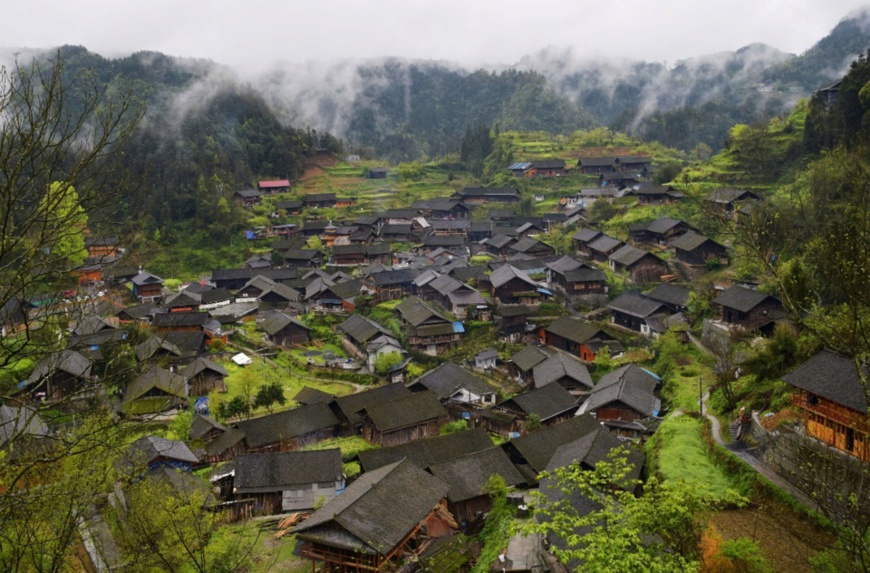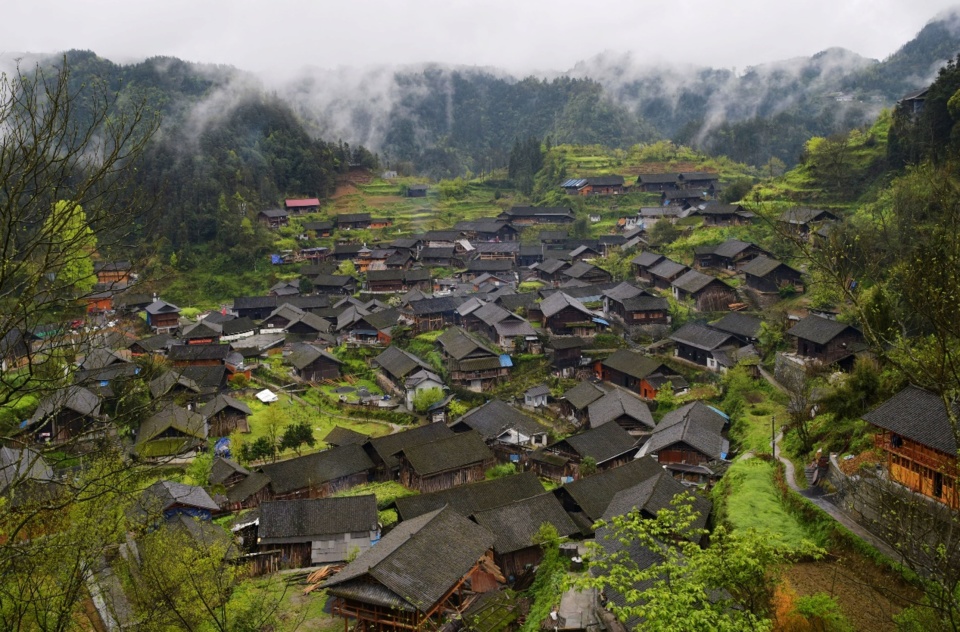By Wan Xiubin, People’s Daily

Wengcao village in Guzhang county, Xiangxi Tujia and Miao Autonomous Prefecture in central China’s Hunan province is home to more than 800 redisents from 180 households. It is a village of Miao ethnic group. It picks the first batch of tea leaves this spring. Photo by Chen Bisheng, People’s Daily Online
Over 20 tea pickers waving their hands around lines of dozen-inch-high tea plants and taking the fresh tea leaves into their pack baskets – that is a late-spring scene observed from the top of a lush mountain in Guzhang county, central China’s Hunan province where the lands were once incredibly barren and empty.
Similar scenes can also be observed in Qingchuan county of Sichuan province, as well as Pu’an and Yanhe counties of Guizhou province, and it all owes to the generous assistance offered by Huangdu village of Anji county, east China’s Zhejiang province which donated 19 million tea seedlings to 34 impoverished villages in the above four counties in the past two years.
These white tea seedlings, planted on around 358 hectares of land, have brought hope of a better life to the recipient counties.
The 34 impoverished villages in the four counties were chosen as recipients because they have suitable precipitation, temperature, soil and elevation for growing white tea plants, and it was a decision made by the technicians from the Tea Research Institute with the Chinese Academy of Agricultural Sciences and Zhejiang Tea Group who traveled tens of thousands of kilometers to central and western China and conducted three field investigations in June, 2018.
They received the donation in October, 2018. Wang Yongming, Party chief of Qingping village in Qingchuan county, recalled the busy day when the first batch of one million seedlings arrived in three refrigerated trucks, saying that the saplings were immediately planted after they were unloaded by hundreds of earnest villagers.
Guzhang county’s Wengcao village also cherishes the saplings very much. “We organized technical training for all corn growers in the village to familiarize them with tea planting,” said Ou Sanren, a cadre of the village.
By establishing a cooperative, carrying out land transfer and distributing shares of the cooperative to planters based on their planting performances, the tea planting industry attracted more and more villagers in Wencao.
However, the tea seedlings planted in Guzhang county were struck by several natural disasters. In the winter of 2018, the county was hit by a heavy snow rarely seen in southern China, resulting in partial damage of the plants. Unfortunately, the replanted seedlings were once again destroyed by the torrential rain pours in July the following year.
“Anji county soon sent technicians to help us. They visited the damaged tea gardens and helped farmers rebuild their planting business,” Ou said, adding that a total of 300,000 tea seedlings were replanted after the two disasters.
As the benefactor, Anji county has continuously strengthened follow-up assistance and technical guidance to the recipients. Over the past more than two years, it has sent 275 technicians in 42 batches to Hunan, Sichuan and Guizhou provinces.
Huangdu village, the major force of the assistance, sent 35 skilled tea planters who made a total of 115 trips to the recipients for giving training on planting and management. Some of the technicians even offered on-site technical guidance for more than half a year.
Under the meticulous care of all sides, the tea seedlings have firmly taken root, bringing hope to impoverished locals for reducing poverty and increasing income. As the plants are currently yielding the first batch of tea leaves, the hope has been turned into reality.
Watching the shiny green tea leaves in her tea garden, 40-year-old Long Xingmei from Wengcao village showed a joyful face.
Long’s husband works outside of the village, which leaves the woman in a difficult situation – she has to take care of her child, her paralyzed elder brother, and her septuagenarian mother, alone. As a result, her family suffers dire poverty.
Fortunately, the white tea seedlings have brought hope to the family. Contracting her family’s land on the mountain to a tea cooperative, Long now earns 3,600 yuan a year. Her mother, who is hale and hearty, also works a part-time job at the cooperative and makes about 8,000 yuan every year.
“We became a shareholder of the cooperative, and we will surely get rid of poverty this year!” Long said.
45-year-old Tan Hua’ai in Tunshang village, Digua township, Pu’an county is another beneficiary of the tea seedlings as her family shook off poverty this March. The planting area of white tea in the county has reached 133 hectares, benefiting 2,577 people from 862 impoverished households. The average income generated by tea planting stands at 4,659 yuan per household.
The tea planting business has more stories to tell about poverty alleviation.
On March 12, 31 sets of tea dryers donated by Anji Yuanfeng Tea Machinery Co., Ltd. were assembled in Yanhe county. “The machines could process 350 kilograms of high-quality dry tea leaves in a day, which largely improved our efficiency,” said Zhang Yong, head of a local agricultural cooperative, adding that the dried tea leaves are delivered to tea companies in Zhejiang for sale, so the villagers don’t have to worry about sale and marketing.
The processing and distribution of the tea leaves had been taken good care of by Zhejiang when it signed the donation agreement. Huangdu village reached a deal with the Zhejiang Tea Group which agreed to distribute all the tea under the poverty alleviation program and registered a trademark.
As a sustainable poverty alleviation method that helps locals develop industries, the tea seedlings from Anji are driving development on a wider range.
So far, Pu’an has planted 716.8 hectares of white tea, and is planning to develop a comprehensive tea business together with green tea and black tea plantation. Yanhe, planting 335 hectares of white tea, is striving to make tea panting a pillar industry that propels the county’s poverty alleviation.
Ou compares white tea as a cash cow, saying that his village is currently integrating local natural and cultural resources in an attempt to combine the tea business with tourism.
“Our village received 4,000 tourists last summer and is witnessing increasing popularity,” Ou disclosed.
Similar scenes can also be observed in Qingchuan county of Sichuan province, as well as Pu’an and Yanhe counties of Guizhou province, and it all owes to the generous assistance offered by Huangdu village of Anji county, east China’s Zhejiang province which donated 19 million tea seedlings to 34 impoverished villages in the above four counties in the past two years.
These white tea seedlings, planted on around 358 hectares of land, have brought hope of a better life to the recipient counties.
The 34 impoverished villages in the four counties were chosen as recipients because they have suitable precipitation, temperature, soil and elevation for growing white tea plants, and it was a decision made by the technicians from the Tea Research Institute with the Chinese Academy of Agricultural Sciences and Zhejiang Tea Group who traveled tens of thousands of kilometers to central and western China and conducted three field investigations in June, 2018.
They received the donation in October, 2018. Wang Yongming, Party chief of Qingping village in Qingchuan county, recalled the busy day when the first batch of one million seedlings arrived in three refrigerated trucks, saying that the saplings were immediately planted after they were unloaded by hundreds of earnest villagers.
Guzhang county’s Wengcao village also cherishes the saplings very much. “We organized technical training for all corn growers in the village to familiarize them with tea planting,” said Ou Sanren, a cadre of the village.
By establishing a cooperative, carrying out land transfer and distributing shares of the cooperative to planters based on their planting performances, the tea planting industry attracted more and more villagers in Wencao.
However, the tea seedlings planted in Guzhang county were struck by several natural disasters. In the winter of 2018, the county was hit by a heavy snow rarely seen in southern China, resulting in partial damage of the plants. Unfortunately, the replanted seedlings were once again destroyed by the torrential rain pours in July the following year.
“Anji county soon sent technicians to help us. They visited the damaged tea gardens and helped farmers rebuild their planting business,” Ou said, adding that a total of 300,000 tea seedlings were replanted after the two disasters.
As the benefactor, Anji county has continuously strengthened follow-up assistance and technical guidance to the recipients. Over the past more than two years, it has sent 275 technicians in 42 batches to Hunan, Sichuan and Guizhou provinces.
Huangdu village, the major force of the assistance, sent 35 skilled tea planters who made a total of 115 trips to the recipients for giving training on planting and management. Some of the technicians even offered on-site technical guidance for more than half a year.
Under the meticulous care of all sides, the tea seedlings have firmly taken root, bringing hope to impoverished locals for reducing poverty and increasing income. As the plants are currently yielding the first batch of tea leaves, the hope has been turned into reality.
Watching the shiny green tea leaves in her tea garden, 40-year-old Long Xingmei from Wengcao village showed a joyful face.
Long’s husband works outside of the village, which leaves the woman in a difficult situation – she has to take care of her child, her paralyzed elder brother, and her septuagenarian mother, alone. As a result, her family suffers dire poverty.
Fortunately, the white tea seedlings have brought hope to the family. Contracting her family’s land on the mountain to a tea cooperative, Long now earns 3,600 yuan a year. Her mother, who is hale and hearty, also works a part-time job at the cooperative and makes about 8,000 yuan every year.
“We became a shareholder of the cooperative, and we will surely get rid of poverty this year!” Long said.
45-year-old Tan Hua’ai in Tunshang village, Digua township, Pu’an county is another beneficiary of the tea seedlings as her family shook off poverty this March. The planting area of white tea in the county has reached 133 hectares, benefiting 2,577 people from 862 impoverished households. The average income generated by tea planting stands at 4,659 yuan per household.
The tea planting business has more stories to tell about poverty alleviation.
On March 12, 31 sets of tea dryers donated by Anji Yuanfeng Tea Machinery Co., Ltd. were assembled in Yanhe county. “The machines could process 350 kilograms of high-quality dry tea leaves in a day, which largely improved our efficiency,” said Zhang Yong, head of a local agricultural cooperative, adding that the dried tea leaves are delivered to tea companies in Zhejiang for sale, so the villagers don’t have to worry about sale and marketing.
The processing and distribution of the tea leaves had been taken good care of by Zhejiang when it signed the donation agreement. Huangdu village reached a deal with the Zhejiang Tea Group which agreed to distribute all the tea under the poverty alleviation program and registered a trademark.
As a sustainable poverty alleviation method that helps locals develop industries, the tea seedlings from Anji are driving development on a wider range.
So far, Pu’an has planted 716.8 hectares of white tea, and is planning to develop a comprehensive tea business together with green tea and black tea plantation. Yanhe, planting 335 hectares of white tea, is striving to make tea panting a pillar industry that propels the county’s poverty alleviation.
Ou compares white tea as a cash cow, saying that his village is currently integrating local natural and cultural resources in an attempt to combine the tea business with tourism.
“Our village received 4,000 tourists last summer and is witnessing increasing popularity,” Ou disclosed.
 Menu
Menu
 Chinese villages team up for poverty alleviation through tea planting
Chinese villages team up for poverty alleviation through tea planting
















